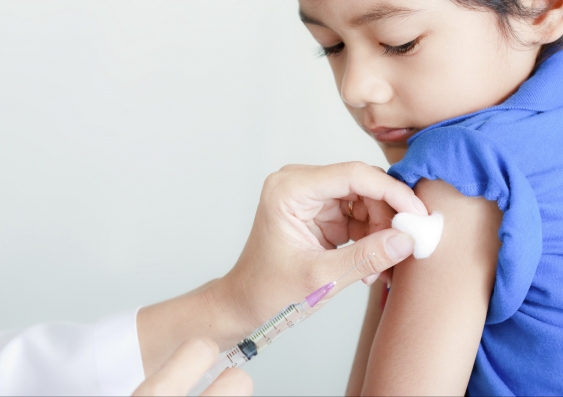Taking the big stick to vaccine conscientious objectors might backfire
Financially punishing parents who refuse vaccinations for their children may not be an effective public health strategy, writes Raina Macintyre.
Financially punishing parents who refuse vaccinations for their children may not be an effective public health strategy, writes Raina Macintyre.

OPINION: The Federal Government has announced that it will end the conscientious objector exemption on children’s vaccination for access to childcare benefits or family payments from 1 January 2016.
This is a poorly thought out and ill-informed strategy that may end up worsening, rather than improving the alleged problem in a country that boasts among the best immunisation rates in the world.
It was under a coalition government in 1998 that Australia introduced financial incentives to improve immunisation rates by linking timely and completed infant immunisation to payment of the maternity allowance and childcare benefits.
This scheme has always allowed parents who refuse immunisation for their children to still claim these financial benefits, but require them to register their conscientious objection to immunisation.
This places an additional administrative hurdle for parents who refuse immunisation, and therefore is likely to separate genuine vaccine refusers from those who are hesitant or simply delay vaccination, and has been shown to be effective in improving immunisation and parental willingness to vaccinate.
Why, then, does the current government want to punish vaccine refusers? Allowing parents to refuse vaccination without punishment is thought to be important in maintaining public confidence in vaccination.
Most democratic societies allow conscientious objection to vaccination without punitive measures against parents who exert this choice.
Introducing punitive measures may have the opposite effect to the intended effect, and may increase public mistrust of vaccination and resentment of coercion. It also allows the anti-vaccination lobby to represent themselves as persecuted martyrs.
I will need to see more evidence to be convinced there is a problem at all. A rigorous public health approach would be to first define and understand the problem, if indeed there is one, and then address it with an appropriately targeted strategy.
We are told in the media that the number of vaccine refusers has doubled in a decade. Which vaccines is this number referring to?
This is not the only question that remains unanswered.
Have new vaccines for different age groups been added to the schedule in that time, such as adolescent HPV vaccine and is refusal for these vaccines being counted in this number?
What relationship, if any, does this "increase" in vaccine refusers have to the cessation of GP immunisation incentives in 2013?
What other reasons could there be for an increase in refusals? Have vaccine adverse events increased? Do parents have other concerns which we need to address?
We have an obligation to understand and address the concerns of parents, instead of punishing them. Maintaining public confidence in vaccines and trust in immunisation programs is key to the success of these programs.
No vaccine is 100% safe or 100% effective, and sometimes we do get it wrong. For example, the case of the 1998 introduction in the United States of the first rotavirus vaccine, Rotashield. This vaccine was withdrawn when post-licensure surveillance revealed an increased risk of intussusception, a serious, potentially fatal side effect which was not picked up by initial clinical trials, because these trials were too small to detect this risk.
In times like this, any public perception of force, coercion or punishment for non-vaccination can cause significant damage to vaccination programs. Immunisation programs are a partnership in trust between those who deliver the programs and the parents who bring their children for vaccination. This trust needs respect to be maintained, and punitive measures will erode trust. There are many historical examples of public backlash when such trust is eroded by overly dogmatic or forceful government actions.
Past experience tells us that genuine vaccine refusers are a small but vocal minority, and there is a larger group of hesitant or uncertain parents who can be positively influenced to vaccinate their children. Hard core vaccine refusers are unlikely to change their views, but there are far more potential gains in working constructively, using proven strategies, with the uncertain parents. Instituting draconian punitive measures runs the risk of driving the uncertain group to becoming hard core refusers instead of the desired effect of making them vaccinate their children. These parents, after all, work and pay taxes like the rest of us, so from an equity point of view should still be allowed to access financial benefits.
Finally, the problem first needs to be defined in terms of risk of vaccine-preventable diseases. What diseases that can be prevented by vaccines on our immunisation schedule are causing epidemics and deaths in Australia? What are the vaccination rates for these diseases? What is the cause of poor disease control?
Real problems which have been identified include a lack of a universal funding mechanism for catch-up vaccination of under-immunised migrant and refugee groups including both adults and children and buck-passing between states and Commonwealth. Recent epidemics of measles in Australia have clearly been linked to under-immunised migrant groups, mainly adolescents and adults. In fact, the infant vaccination rates in the most affected part of Sydney for the measles outbreaks of 2012-13 was 95%, indicating that the problem lay elsewhere.
Even the tragic deaths of infants from pertussis are usually in infants too young to have received the full pertussis immunisation schedule, such as the recent tragic death of baby Riley, who was only 4 weeks old and too young for his pertussis vaccinations. The problem is adults who are susceptible to pertussis, and who can then infect vulnerable infants.
The problems of identified gaps in adult immunisation are the pressing issue facing us today, which no amount of punishment of parents who refuse infant vaccination will fix.
Professor Raina MacIntyre is Head of the School of Public Health and Community Medicine at UNSW and Professor of Infectious Disease Epidemiology.